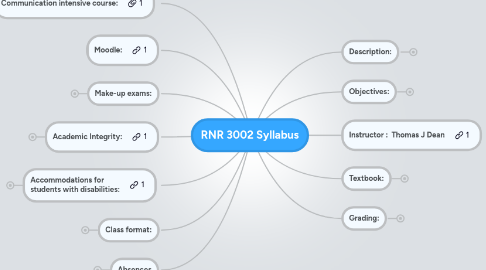
1. Description:
1.1. Two credit hours
1.2. Prerequisite: RNR 2101
1.3. Basic knowledge of personal computer and email is assumed
1.4. A generalized approach to silviculture focusing on the ecological principles and practices for stand regeneration and the definition and achievement of stand conditions that will satisfy specific goals and objectives.
2. Objectives:
2.1. By the end of the course, students should have the skills to solve basic silvicultural problems, understand the silviculturist's multidisciplinary role in meeting forest landowner objectives, and be able to effectively communicate elementary principles and practices of silviculture with other foresters, forest landowners, and interest groups.
2.2. Course objectives are accomplished through independent study, research, and in-class construction of concept maps.
3. Communication intensive course:
3.1. This is a certified Communication-Intensive (C-I) course which meets all of the requirements set forth by LSU’s Communication across the Curriculum program, including
3.1.1. Instruction and assignments emphasizing informal and formal technological communication and;
3.1.2. Teaching of discipline-specific communication techniques;
3.1.3. Use of draft-feedback-revision process for learning;
3.1.4. Practice of ethical and professional work standards;
3.1.5. 40% of the course grade rooted in communication-based work; and
3.1.6. A student/faculty ratio no greater than 35:1.
3.2. Students interested in pursuing the LSU Distinguished Communicators certification may use this C-I course for credit.
3.3. http://www.cxc.lsu.edu/
4. Instructor : Thomas J Dean
4.1. TJD
4.2. Room 210, RNR Bldg
4.3. (225) 578-4216
4.4. [email protected]
5. Textbook:
5.1. Nyland, R.D. 2002. Silviculture: Concepts and Applications, 2nd Ed. Waveland Press, Long Grove, Ill.
6. Moodle:
7. Grading:
7.1. Final grades will be based on the percentage of total points earned:
7.1.1. A: 90 - 100%
7.1.2. B: 80 - 89%
7.1.3. C: 70 - 79%
7.1.4. D: 60 - 69%
7.1.5. F: < 60%
7.2. Breakdown:
7.2.1. Concept maps: 50%
7.2.2. 2 hour exams: 30%
7.2.3. Final exam: 20%
8. Make-up exams:
8.1. Make-up exams will be given only for normally excused absences. Arrangements should be made in advance. Be prepared to provide documentation to account for normally excused but unexpected absences. I reserve the right to consider each case individually.
9. Academic Integrity:
9.1. All assignments must be individually prepared. Do not copy tables, figures, or text from classmates or other published sources. To do so violates the student code of LSU and obligates me to report to the Dean of Students, without exception.
10. Accommodations for students with disabilities:
10.1. The University is committed to making reasonable efforts to assist individuals with disabilities in their efforts to avail themselves of services and programs offered by the University. To this end, Louisiana State University will provide reasonable accommodations for persons with documented qualifying disabilities. If you have a disability and feel you need accommodations in this course, you must present a letter to me from Disability Services 115 Johnston Hall, indicating the existence of a disability and the suggested accommodations.
10.2. If you feel anxious taking tests, have trouble completing tasks, or feel any impediments in meeting the requirements of this class or any other class, please see the people in Disability Services. They have truly helped students that have taken this class
10.3. You can also talk to me, but I am not a counselor. I will listen and mostly likely urge to visit Disability Services.
11. Class format:
11.1. A "Flipped" class structure
11.2. Work on mimd maps during the class period
11.3. Research to produces maps conducted outside of class
12. Absences
12.1. Exams
12.2. Class periods
12.2.1. Work on concept maps is conducted online; consequently, students should still be able to contribute to the maps
12.2.2. In the case of illness or participation in University-sponsored events, with sufficient documentation, the student and instructor will come to an agreement on sufficient contribution to the class-time activities
